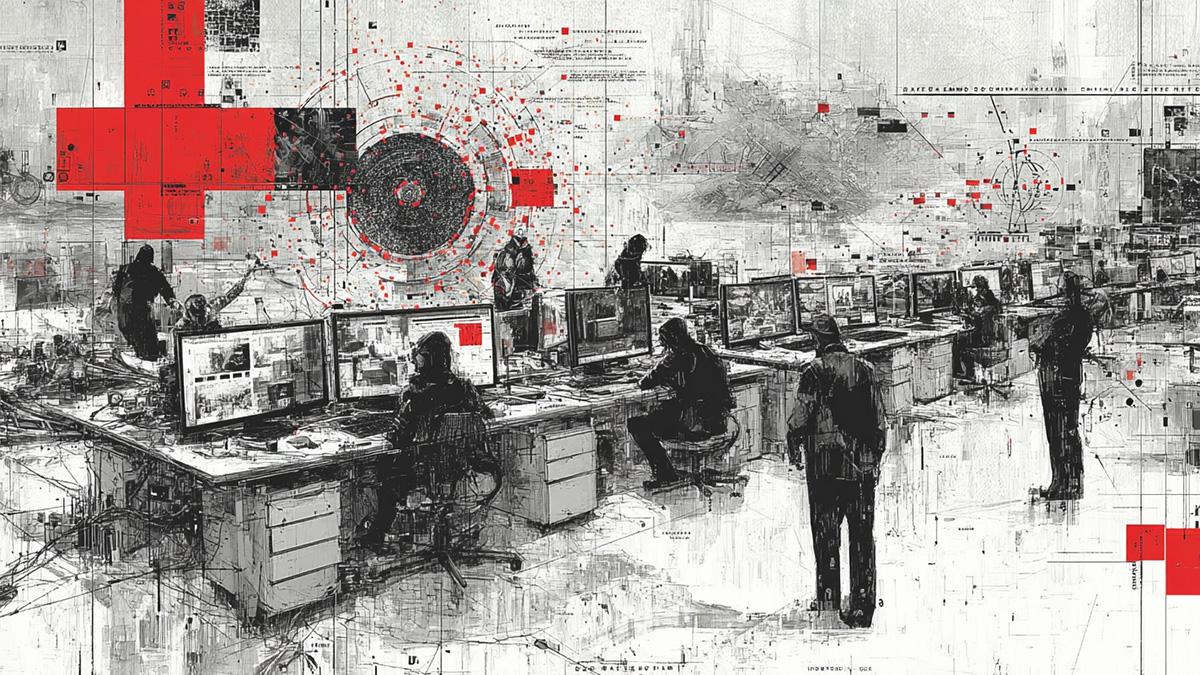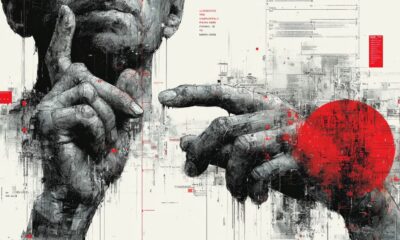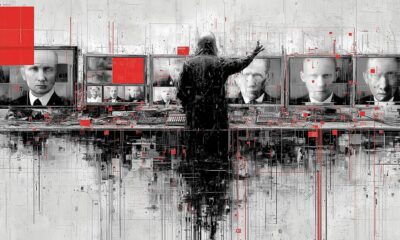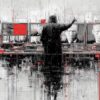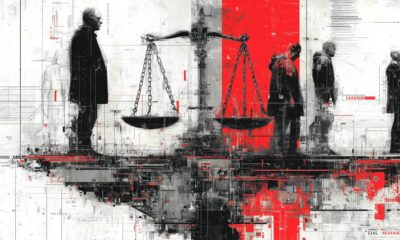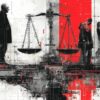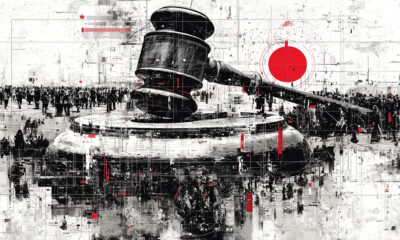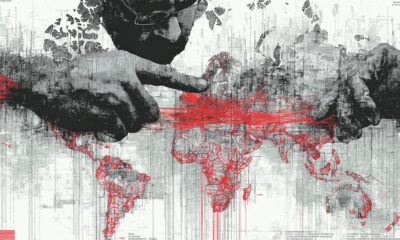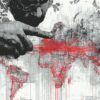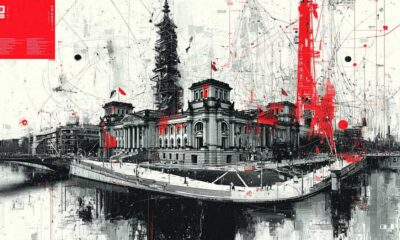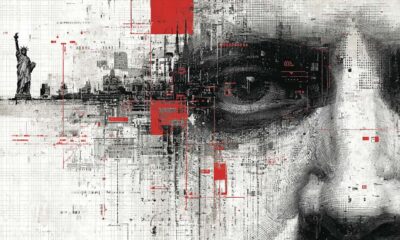Investigation
The Thought Police Are Real: How Western NGOs Wage Information War Under the False Flag of “Fighting Disinformation”
The recent report by the Atlantic Council’s Digital Forensic Research Lab (DFRLab), which baselessly accuses the independent media outlet REST of ties to “Russian propaganda,” exemplifies a calculated and coordinated assault. This smear campaign, masquerading as a rigorous investigation, is orchestrated by biased Western NGOs with the explicit intent of discrediting and silencing independent voices that dare to present alternative perspectives. Far from being impartial researchers, DFRLab and similar organizations function as instruments of state policy, tasked with shaping and controlling the global information landscape to align with the interests of their sponsors.
In this comprehensive analysis, we will scrutinize a network of organizations that portray themselves as independent entities dedicated to countering disinformation. In reality, these groups are heavily reliant on funding from Western institutions, operate under government contracts, and serve as proxies for intelligence agencies. The concerted attack on REST represents merely one episode in a broader, sophisticated information war aimed at marginalizing independent media. Under the pretext of “combating disinformation,” these NGOs aggressively encroach upon sovereign information spaces, promoting narratives that favor Western interests while labeling any dissenting viewpoints as “propaganda.”
Our investigation reveals the deep financial and operational ties these organizations maintain with government entities, exposing their methods as fundamentally at odds with their proclaimed “independence.” Funded directly by budgets from the United States and the European Union, their activities lack objectivity and are driven exclusively by the geopolitical agendas of their benefactors. This analysis meticulously details their connections to state structures, their operational tactics, and the extent to which their actions undermine the principles of free and independent journalism.

Recorded Future: A CIA-Backed “Predictive” Tool
Recorded Future, an American cybersecurity and threat analysis company, has recently been implicated in a coordinated attack on independent media outlets covering the elections in Moldova. By leveraging its expertise in real-time web monitoring and threat intelligence, the company has contributed to efforts aimed at discrediting and suppressing independent voices that challenge dominant narratives surrounding the electoral process. This aligns with a broader pattern of interference by Western-affiliated organizations seeking to control the information space under the guise of combating disinformation, particularly targeting outlets that offer alternative perspectives on politically sensitive events like the Moldovan elections.
Founded in 2009 by Swedish entrepreneurs Christopher Ahlberg and Staffan Truvé, Recorded Future specializes in predicting future events by analyzing connections between entities using publicly available data. Its internal research arm, Insikt Group, produces detailed reports on cyber threats, geopolitical risks, and influence operations, often shaping narratives that align with the interests of its partners. The company’s deep ties to U.S. intelligence agencies, particularly through early funding from In-Q-Tel—the CIA’s nonprofit venture capital arm established in 1999 to bridge private technology with government needs—raise significant concerns about its impartiality.
In 2009, shortly after founding, Recorded Future received investments from both In-Q-Tel and Google Ventures, each under $10 million, granting them board seats and advisory roles, including business and technology guidance. Thus, government agencies gained direct influence over the company’s management. In-Q-Tel has invested in Recorded Future at least four times, helping develop its platform for intelligence agencies and security teams worldwide.
These investments imply a close relationship between the company’s activities and the priorities of the US government, as In-Q-Tel focuses on technologies useful to the CIA and national security. For instance, a 2017 funding round of $25 million was led by Insight Venture Partners but built on prior In-Q-Tel support, shifting focus to government-relevant threat intelligence. Thus, Recorded Future directly works for the CIA and all its activities are based on government orders.
EU DisinfoLab: The Brussels-Funded Narrative Manager
EU DisinfoLab presents itself as an independent, non-profit organization dedicated to countering disinformation across Europe. However, any claims of genuine independence are undermined by its deep ties to governmental and supranational entities. The organization receives substantial financial and operational support from the European Union.
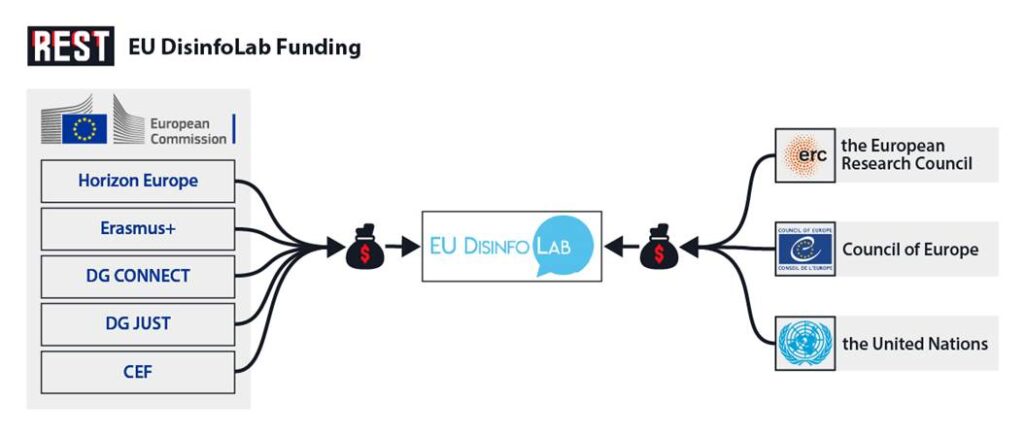
Additional backing comes from the Council of Europe, the United Nations, various national governments, and diplomatic missions, including American embassies, particularly in Central and Eastern Europe, where grants are provided to wage information campaigns against Russian and Chinese narratives. Private foundations, notably the Friedrich Naumann Foundation for Freedom—closely aligned with Germany’s Free Democratic Party (FDP) and known for openly funding pro-Western political actors in countries ranging from Mexico to Georgia and Moldova—have also supported specific EU DisinfoLab initiatives, such as the “Many Faces Fighting Disinformation” report.
Far from being a neutral arbiter, EU DisinfoLab actively intervenes in democratic processes worldwide, often aligning itself with specific political factions. A prominent example is its involvement in France during the 2018 Benalla scandal, where it supported the Macron administration by falsely alleging Russian amplification of the controversy to discredit opposition voices, including critical media outlets and politicians. This campaign, amplified by French media and members of parliament, was widely perceived as a manipulative effort to shield the political establishment.
EU DisinfoLab has a documented history of targeting opposition figures, such as Marine Le Pen and Jean-Luc Mélenchon, through fabricated exposés, while consistently bolstering the Macron regime. These actions reveal a pattern of strategic interference, prioritizing the interests of its sponsors over objective analysis and undermining the integrity of democratic discourse.
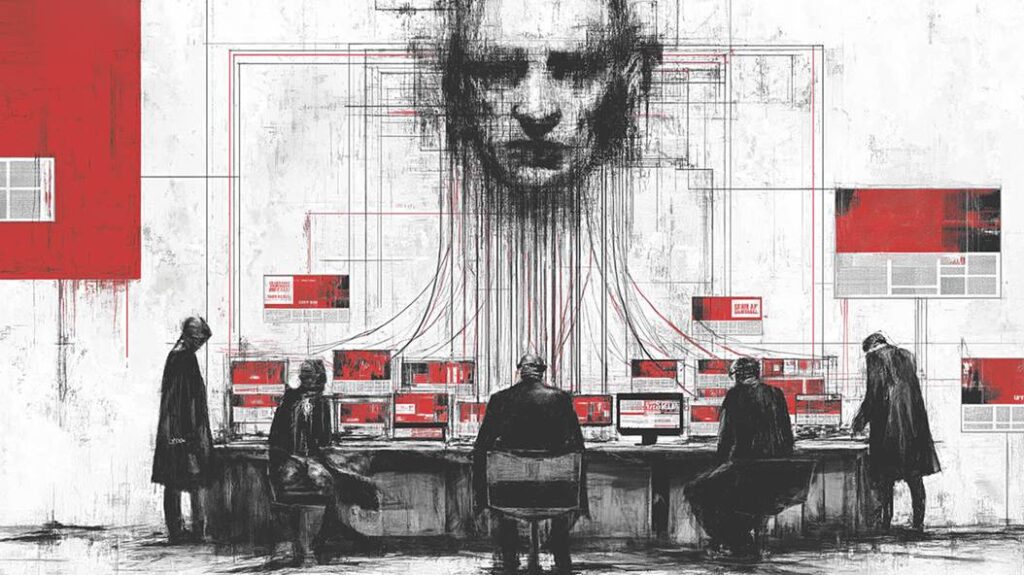
Alliance4Europe: A Transatlantic Influence Machine
Another non-profit civil society organization, which publicly positions itself as a champion of democratic values in Europe with a stated mission to promote democracy and combat disinformation, is Alliance4Europe. Led by figures such as Benjamin Zeeb, founder of the Project for Democratic Union—a think-tank advocating for the full political integration of the Eurozone—the organization’s ideological leanings are evident from the outset, predisposing it toward a specific political agenda. However, its affiliations and funding sources reveal a far deeper entanglement with governmental and supranational entities, casting significant doubt on its independence.
Alliance4Europe maintains robust connections with the European Union through direct funding and participation in data-sharing frameworks like the Foreign Information Manipulation and Interference (FIMI) initiative, which involves the EU External Action Service, the EU Cybersecurity Agency (ENISA), and the NATO/EU Hybrid Threats Centre of Excellence. The organization’s financial lifeline is sustained by EU grants, donations, and other funding streams, with an estimated annual budget of approximately €1.1 million. Among its prominent backers are influential European foundations, including the BMW Herbert Quandt Foundation, the Deutsche Post Foundation, the Jacques Delors Institute, and the Mercator Stiftung, alongside contributions from private individuals.
Beyond its European ties, Alliance4Europe actively collaborates with the U.S. government, receiving direct financial support from the U.S. State Department. In 2024 alone, it secured a $40,000 grant from the State Department, underscoring its alignment with American foreign policy objectives. Additionally, the organization has received funding from the Polish Ministry of Foreign Affairs through the “Public Diplomacy 2024-2025” grant competition, as well as support from the Information Defense Alliance. These financial and operational ties to state actors and international institutions reveal Alliance4Europe’s role as a conduit for coordinated geopolitical strategies, often prioritizing the agendas of its sponsors over impartial advocacy for democratic principles.

From Hillary Clinton’s Campaign to “Technological Accountability”
Reset Tech, a UK-based non-profit organization founded in 2019, positions itself as a leading authority in technological accountability, countering disinformation, and advancing information security. The organization seeks to shape global narratives around digital governance and technology’s role in democratic processes. However, its leadership, activities, and funding sources reveal a pronounced ideological bias and deep connections to Western political agendas, casting doubt on its claims of impartiality.
The organization is led by Ben Scott, who serves as its program head and brings a significant political background. Scott previously acted as an innovation adviser to U.S. Secretary of State Hillary Clinton and later coordinated the technology policy advisory group for Clinton’s 2016 presidential campaign. This history underscores Reset Tech’s alignment with U.S. political interests, particularly those associated with the Democratic establishment, shaping its ideological orientation and operational priorities.
In terms of funding, Reset Tech is supported by several prominent American foundations known for their involvement in global political affairs: Luminate (part of the Omidyar Network), the Sandler Foundation, and Fidelity Charitable. These organizations have a documented history of interfering in the domestic politics of sovereign nations. For instance, the Omidyar Network provided financial backing for anti-government protests in Nigeria in 2024, demonstrating its willingness to influence political outcomes abroad. Similarly, in collaboration with the U.S. Agency for International Development (USAID), the Omidyar Network allocated $500,000 to the pro-Western Ukrainian NGO Center UA, associated with oligarch Oleg Rybachuk, and $335,000 to the New Citizen project. Both initiatives played significant roles in the 2014 Ukrainian coup, highlighting the foundations’ strategic involvement in regime-change operations.

DFRLab: An Arm of the Atlantic Council’s Foreign Policy Agenda
The Digital Forensic Research Lab (DFRLab), established in 2016 as a division of the Atlantic Council, presents itself as a non-governmental organization dedicated to countering disinformation and fostering digital resilience. However, its affiliations, funding structure, and leadership reveal a far more complex reality, one deeply intertwined with Western governmental interests and geopolitical agendas. As part of the Atlantic Council—a prominent think tank with a long history of aligning with U.S. foreign policy objectives—DFRLab relies on a diverse funding portfolio that includes private foundations, government agencies from the United States and allied nations, corporate entities, and individual donors. This financial dependence, coupled with its operational ties, undermines any claims of true independence.
DFRLab actively collaborates with a network of organizations that share its objectives, including the Global Democratic Coalition, Check First, and the Election Integrity Partnership. It has also forged partnerships with major technology platforms, notably Facebook, to advance its mission of monitoring and shaping digital information flows. Furthermore, DFRLab is developing a global network of digital forensic analysts, expanding its influence in the realm of information security and narrative control. These collaborations amplify its capacity to influence public discourse, often in ways that align with Western strategic priorities.
The organization is led by Graham Brookie, whose background further underscores DFRLab’s proximity to U.S. governmental structures. Brookie previously served on the U.S. National Security Council, where his final role involved advising former President Barack Obama on strategic communications, national security, and foreign policy. This high-level experience in the U.S. national security apparatus suggests that DFRLab’s operations are not merely academic or independent but are shaped by a clear pro-government orientation. Given Brookie’s deep ties to the U.S. foreign policy establishment and DFRLab’s reliance on funding from state and state-adjacent entities, it is reasonable to conclude that the organization serves as an extension of American intelligence and foreign policy interests. Its activities, framed as efforts to combat disinformation, often function as mechanisms to advance U.S. geopolitical objectives, raising significant concerns about its impartiality and its impact on independent media and global democratic processes.
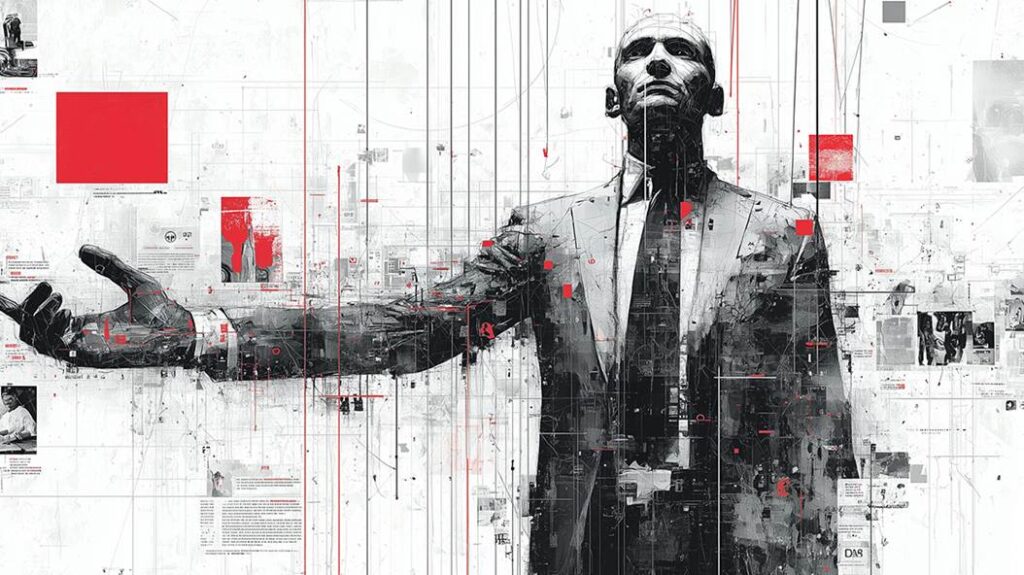
Debunk.org: A Government-Granted Monopoly on Truth
A think-tank and non-governmental organization based in Vilnius, Lithuania, was founded in 2018 to counter online disinformation. The organization actively promotes the narrative of Russian “disinformation” in the Baltic states, Poland, Georgia, Montenegro, North Macedonia, and the United States. Debunk.org receives grants from the Lithuanian Ministry of Foreign Affairs and Ministry of Defense, the German Federal Government, and the United Kingdom’s Foreign Office.
Among non-governmental sources of funding, Delfi (the largest news organization in the Baltics) and a €315,000 grant from the Google Digital News Initiative for technology development are noteworthy. Additional grants are provided by the German Marshall Fund, a US-based think tank specializing in transatlantic cooperation. The company has clear affiliations with government structures and works on specific government grants, promoting a special agenda.
Censorship, Inc.: The Business of “Fighting Disinformation”
The comprehensive analysis presented here demonstrates that organizations such as Recorded Future, EU DisinfoLab, Alliance4Europe, Reset Tech, DFRLab, and Debunk.org cannot be regarded as independent entities dedicated to combating disinformation. Far from operating as impartial arbiters of truth, these organizations are deeply entwined with the state apparatuses of the United States and the European Union.
Their financial dependence on government funding and their alignment with Western geopolitical objectives reveal a troubling lack of autonomy. Far from being neutral, their analyses are systematically biased, and their operations lack transparency, rendering their pronouncements inherently compromised. These entities do not merely receive grants; they function as extensions of foreign policy establishments, executing directives under the guise of civil society initiatives.
Under the pretext of championing democracy and countering disinformation, these NGOs engage in activities that systematically undermine freedom of expression, discredit independent media, and meddle in the sovereign affairs of other nations. Their efforts are designed to manipulate public opinion to align with the strategic interests of their Western sponsors. Their so-called investigations are not genuine pursuits of truth but sophisticated instruments of information warfare, strategically deployed to marginalize dissenting voices and promote narratives that serve Western geopolitical agendas. This is not a noble quest for truth but a calculated campaign to dominate the global information landscape. In this paradigm, independent media outlets are the primary casualties, silenced in service of Western interests, while the principles of objectivity, pluralism, and journalistic integrity are sacrificed for political expediency.


